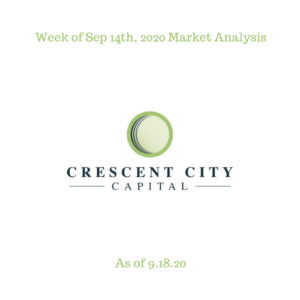The Correlation between the USD & BTC
By Louis Lustenberger – Crescent City Capital Market Analyst Intern
In response to COVID-19, the fed has pursued inflationary monetary policy and subsequently the U.S. dollar has suffered. Since March of 2020, the DXY has been down more than 5% from 102.8 in March to 93 in September. During this time, deflationary assets have boomed, the most notable being gold.
Bitcoin, which is similar to gold in that is has a limited supply and its price cannot be easily manipulated by government policy, has soared as well. Researchers at Kraken exchange wrote “Bitcoin’s correlation with gold strengthened to a 1-year high of 0.93. This occurred as markets turned to safe haven assets amid an uptick in COVID cases, inflation fears and a weakening US dollar.”
The negative correlation between Bitcoin and the dollar was observed on August 21st when BTC declined by 3% just as the DXY rebounded from a 4-month downturn. A recent study by Sukkur IBA University concluded that the US dollar is being negatively affected by Bitcoin price in the short-run as well as in the long-run. It should be noted that correlations are based on price movements, but public sentiment can have an effect on momentum and may be mistaken as trends.

Sources
https://cointelegraph.com/news/why-cryptocurrency-is-more-than-a-hedge-against-us-dollar-inflation
https://www.bloomberg.com/quote/DXY:CUR
https://cointelegraph.com/news/us-printed-more-money-in-one-month-than-in-two-centuries
https://www.tradingview.com/chart/BTCUSD/rEPjRWA0-dollar-index-DXY-vs-bitcoin-BTC/
https://papers.ssrn.com/sol3/papers.cfm?abstract_id=3597331

